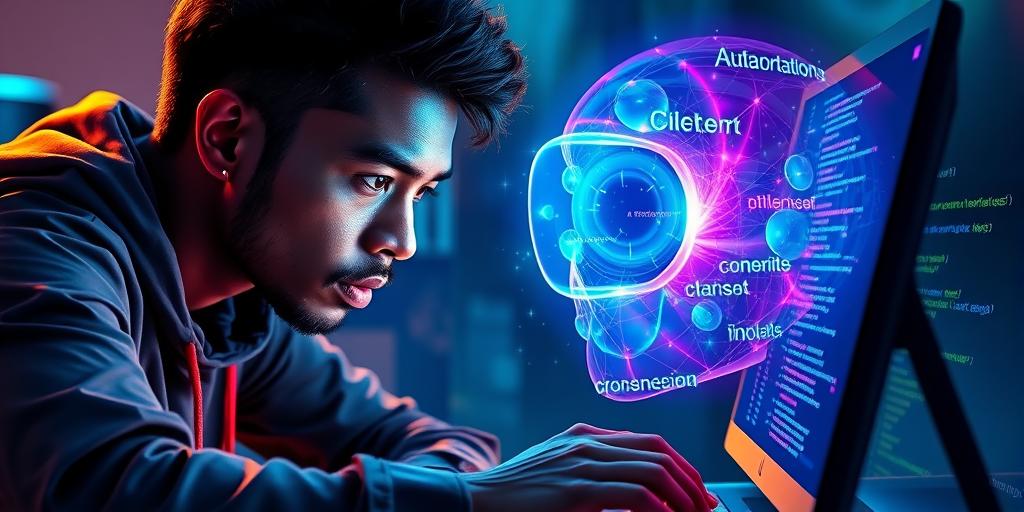Are developers becoming overly reliant on AI assistants like ChatGPT? This isn’t just a question for late-night coding sessions; it’s a critical examination of how AI is reshaping software development, and whether that’s a good thing. The truth is, the relationship between coders and AI is complex, full of potential benefits but also potential pitfalls. Let’s dive in and explore this fascinating intersection of human ingenuity and artificial intelligence.
The Allure of AI-Powered Coding Assistants
AI assistants like ChatGPT offer a compelling proposition for developers: increased efficiency. Imagine generating code snippets, debugging errors, and even crafting entire functions with a few well-crafted prompts. This is the reality for many developers today, and the advantages are undeniable. For junior developers, AI can serve as a digital mentor, helping them learn faster and improve their coding skills more rapidly. Experienced developers, meanwhile, find that AI assistants free up their time, enabling them to focus on the more complex and creative aspects of software engineering. The potential to boost productivity and reduce time-to-market is a huge draw for businesses and developers alike. Some use AI for quick code generation and testing of concepts. This accelerated development cycle can give businesses a competitive edge in the fast-paced tech world. Many find that AI can also assist in learning new coding languages or frameworks more efficiently. By simply asking for assistance with examples, you are improving your understanding and competency as a developer.
AI as a Productivity Booster
One of the key benefits of AI in software development is the significant boost in productivity. By automating repetitive tasks and providing instant code suggestions, AI tools enable developers to focus on higher-level tasks such as design, architecture, and testing. This isn’t just about writing code faster; it’s about unlocking greater efficiency across the entire development process.
AI as a Learning Tool
AI assistants also provide an invaluable learning resource for developers at all skill levels. They can provide quick explanations of complex concepts, offer different solutions to coding problems, and offer different perspectives on specific challenges. This makes them ideal for new developers trying to master new concepts and for seasoned professionals to find innovative solutions to unique challenges.
The Potential Downsides of Over-Reliance on AI
While AI assistants offer numerous benefits, it’s crucial to acknowledge the potential risks of over-reliance. One significant concern is the potential for developers to lose critical problem-solving skills. If developers become too dependent on AI to solve every problem, they might fail to fully understand the underlying code or develop their own problem-solving abilities.
The Black Box Problem
Another issue is the lack of transparency in some AI code generation tools. Understanding how an AI assistant arrives at a particular solution can be difficult, especially for more complex code. This ‘black box’ nature can make it challenging to debug errors or modify code later on. Debugging the AI generated code can be more time-consuming. This can often result in unexpected outcomes for the user.
Security Risks and Ethical Considerations
The use of AI in software development also raises ethical considerations, including the potential for biases in algorithms and the risk of creating insecure code. It is important to review the code that is generated to make sure that it is secure and free of harmful components. Care must be taken to ensure the AI is properly trained on ethical data sources to prevent propagation of bias.
Striking a Balance: The Future of AI and Software Development
The ideal scenario involves a symbiotic relationship between developers and AI assistants. AI should be viewed as a powerful tool that augments human capabilities, rather than replacing them. Developers should strive to maintain a critical mindset, verifying and understanding the code generated by AI before integrating it into their projects. The key is to leverage AI’s efficiency gains while preserving their problem-solving expertise and ethical considerations. Learning how to use these AI tools will be critical to success in this field.
The Human Element Remains Crucial
Despite the advancements in AI, the human element remains crucial in software development. AI can assist with the technical aspects of coding, but it cannot replace the creativity, critical thinking, and problem-solving skills that experienced developers bring to the table. Design, architecture, and testing all remain human-driven processes. The unique ability to design the user interface and user experience will always remain a unique human trait.
Integrating AI into Your Workflow
The best way to approach AI assistance in development is to integrate it into your workflow thoughtfully. Use AI for tasks like code generation or debugging, but don’t just accept the results passively. Understand the code, modify it as needed, and always test rigorously. The integration of AI tools should enhance, not replace, the core skills of a developer.
Embrace the potential of AI while maintaining a healthy dose of skepticism. This balanced approach will allow you to reap the rewards of enhanced productivity and learning without sacrificing your valuable skills or compromising on ethical considerations. Don’t let AI replace you; let it enhance you.
Use AI responsibly and effectively to become a more efficient and effective developer. Master the tools and technologies that are changing the landscape of modern development. Let’s welcome the future of software development with open arms and a critical eye.
Call to Action: Ready to revolutionize your coding workflow with AI? Start exploring the best AI coding assistants today!




